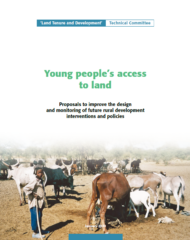
With the global population predicted to rise to over 9 billion by 2050, youth employment is one of the key challenges we face in the 21st century. Many African countries are expected to see more and more young people enter the labour market. Most of them come from rural areas and are already struggling to find work on family farms as landholdings pass from one generation to the next. This guide considers how young people get started as agricultural producers in the global context of a degraded biosphere, increasing inequalities, massive migration and proliferating conflicts. The kind of modernised family farming seen in Western Europe, large-scale production and corporate agriculture cannot resolve the worldwide environmental, economic and social challenges we face today. The only way we can try to redress the current ecological imbalances while producing more wealth per hectare and generating more jobs is through agricultural models based on family or peasant farming. This kind of paradigm shift will be impossible without major economic, social and political changes. We need to reintegrate the economy into society and rebuild the commons in order to push back against the increasing individualisation seen in so many societies. Old and very diverse forms of kinship and family-based organisation still play an important role in many respects. But the examples presented in this guide show that they are no longer sufficient when land and natural resources need to be managed in ways that can deal with problems at very different scales, from the local to the global. This means that we need to continue to invent and build new communities and new institutions by accelerating the implementation of multiple regulatory mechanisms, especially those concerned with access to land.
This guide explores two issues that are often overlooked in current approaches to agricultural development: the way that changes in agrarian structures over several generations affect different types of ‘family’; and land markets. The result of multi-disciplinary exchanges and reflection by members of the ‘Land Tenure and Development’ Technical Committee, this guide combines elements of economics, sociology, anthropology, history, law and political science with case studies from several continents and themes from the Committee’s previous publications. It does not provide ready-made solutions for different development actors, but sets out lines of thought they can follow to in order to deepen their knowledge of the field and ask the right questions.
Cette publication est également disponible en français/ This publication is also avalaible in French
